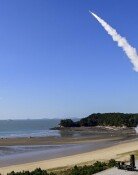Falling Oil Prices: Good for Price, Bad for Exports
Falling Oil Prices: Good for Price, Bad for Exports
Posted July. 19, 2008 09:25,
With the international oil price falling, some are predicting that the oil price hike, which has posed the biggest threat to the Korean economy, might somewhat stabilize. Stabilization is meaningful in that it will sever the vicious cycle linking high oil prices, a surge in the prices of petrochemical products and raw materials, increasing price/expanding current account deficit, and economic slowdown.
Given geopolitical uncertainties in the Middle East and upcoming hurricanes, which may deal a blow to oil refinery facilities, however, a further increase in oil prices is also possible.
Moreover, Korea cannot unconditionally welcome the recently falling oil prices since the economic slowdown of the United States, Koreas major export market, is behind it.
○ Oil demand to fall over the near term
On the NYMEX, West Texas Intermediate for August delivery temporarily fell to 129 dollars per barrel during the day and closed at 129.29 dollars per barrel, down 5.31 dollars per barrel or 3.9 percent from a day ago, Thursday.
The WTI futures price decreased 15.89 dollars per barrel (11 percent) for three trading days since Monday.
In Singapores spot market on Friday, the price of Dubai crude oil declined 2.97 dollars from Thursday to close at 131.08 dollars per barrel.
Experts explained that oil prices have fallen as oil demand is expected to decrease, especially in the United States, due to worries over a global economic slowdown.
On Tuesday, Federal Reserve Board Chairman Ben Bernanke said, The U.S. economy has significantly slowed down, raising the risk of inflation. His remark, effectively recognizing the emergence of stagflation (inflation amid economic slowdown), has accelerated the pace of falling oil prices.
For example, for the past four weeks, oil demand for vehicles has stayed at 9.3 million barrels per day, falling 2.1 percent from a year ago. Global Insight, a U.S. organization specialized in economic and financial analysis, lowered its forecast for sales of vehicles and light trucks for 2008 from 14.7 million units to 14.4 million units. Thus a majority of analysts predict that oil consumption will decrease significantly due to rapidly chilling consumer confidence in the United States.
○ Good news for the Korean economy
Korea is regarded as a nation that cannot produce a drop of oil. Certainly, Korea has heavily depended on imported oil and oil products. A 10 percent increase in oil prices generally cuts the nations economic growth rate by 0.2 percentage points.
Against this backdrop, a decrease in oil prices is considered good news for the Korean economy since it can contribute to raising the economic growth rate and to stabilizing prices of oil products, thus preventing inflation.
In its economic policies for the second half, the Ministry of Strategy and Finance announced that the nations economic growth rate would stand at 4.7 percent and its consumer price would increase 4.5 percent, if the price of Dubai crude oil remains at the 120 dollars per barrel level.
Certainly, some experts argue that the government should adjust its forecast for the nations economic growth and for consumer price due to skyrocketing oil prices. Given that, falling oil prices can be a good chance to boost the nations economy.
Lim Jong-ryong, director of economic policy of the Finance Ministry, said, Oil prices are also possible to drop to 120 dollars per barrel next week. We should not be agitated. However, it is undeniably good news for Koreas economy.
But, falling oil prices can be a mixed blessing for Korea since economic slowdown in the United States may negatively affect Koreas export. In May, Koreas export to the United States decreased 3.1 percent a year ago to 3.87 billion dollars.
Even though the United States accounts for a mere 12 percent of Koreas total export volume, its economic slowdown may affect the global economy as well as developing nations, thus presenting difficulties to Korea.
○ Mid- and long-term energy plan should be established
A few days ago, the government released its own contingency plan, consisting of two phases. Under the plan, the government will implement an oil rationing system and control the sales price of gasoline and diesel oil when the volume of imported oil is smaller than needed by more than 30 percent.
As long as oil price remains stable, the government does not need to implement the contingency plan focused on short-term measures to control supply and demand.
From a mid- and long-term perspective, however, experts argue that Korea should reshuffle its industrial structure so as to cut energy consumption and keep pursuing energy-saving plans through which more alternative energy sources such as renewable energy can be used.
Lee Jin-hoon, senior researcher of Samsung Economic Research Institute, said, Uncertainties still remain. For example, the Iranian nuclear issue can emerge as a hot issue and hurricanes may destroy oil refinery facilities. Given that, Korea should prepare itself for short-term supply and demand problems. At the same time, it should establish energy plans from a long-term perspective and phase in energy-saving measures.







